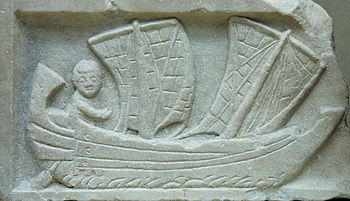Catullus 4

Catullus 4 is a poem by the ancient Roman writer Catullus. The poem concerns the retirement of a well-traveled ship (referred to as a "phaselus", also sometimes cited as "phasellus", a variant spelling). Catullus draws a strong analogy with human aging, rendering the boat as a person that flies and speaks, with palms (the oars) and purpose.
The poem is complex, with numerous geographic references and elaborate litotic double negatives in a list-like manner. It borrows heavily from Ancient Greek vocabulary, and also uses Greek grammar in several sections. The meter of the poem is unusual — iambic trimeter, which was perhaps chosen to convey a sense of speed over the waves.
Scholars remain uncertain whether the story of the construction and voyages of this phasellus (ship, yacht, or pinnace), as described or implied in the poem, can be taken literally. Professor A. D. Hope in his posthumous book of translations from Catullus[1] is one translator who takes it so. His introduction calls the phasellus “his yacht, in which he [Catullus] must have made the return voyage [from Bithynia]” and the translation ends Until she made landfall in this limpid lake. / But that was aforetime and she is laid up now . . . However Hope also left, in his final collection of poetry Aubade, a much freer translation, adaptation, or erotic parody,[2] in which the phasellus seems to be, in effect, a phallus. This version says that the phasellus claims that in his hey-day with mainsail and spanker / He outsailed all vessels; and the ending becomes: At his last landfall now, beyond all resurgence, / View him careened upon a final lee-shore; / . . . Sing for the captain who will put to sea no more!
Among a number of other interpretations, Catullus 4 has also been interpreted as a parody of epic poetry, or the boat as a metaphor for the Ship of state.
Text[edit]
phaselus ille, quem videtis, hospites |
That light ship, which you see, guests, |
Notes[edit]
- ^ Propontis ("in front of Pontus") was the ancient name for the Sea of Marmora, and Ponticum sinum ("Pontic sea") was the name for the Black Sea.
- ^ Mt. Cytorus was a mountain on the southern coast of the Black Sea, between the port cities of Amastris and Cytorus. Cytorus was famous as a source of boxwood.
- ^ The gemelle Castoris ("twin of Castor") refers to Pollux, the other twin in the Castor and Pollux pair, who were also known as the Gemini ("twins"). The two twins were often referred to by only a single name, most commonly Castor, as though they were one, hence the tibi in line 26.
Bibliography[edit]
- Griffith, JG (1983). "Catullus Poem 4: A Neglected Interpretation Revived". Phoenix. 37 (2). Phoenix, Vol. 37, No. 2: 123–128. doi:10.2307/1087452. JSTOR 1087452.
- Coleman, KM (1981). "The Persona of Catullus' Phaselus". Greece and Rome. 28: 68–72. doi:10.1017/S0017383500033507.
- Putnam, MCJ (1962). "Catullus' Journey (Carm. 4)". Classical Philology. 57: 10–19. doi:10.1086/364642.
- Copley, FO (1958). "Catullus 4: The World of the Poem". Transactions and Proceedings of the American Philological Association. 89. Transactions and Proceedings of the American Philological Association, Vol. 89: 9–13. doi:10.2307/283659. JSTOR 283659.
References[edit]
- ^ The shorter poems of Gaius Valerius Catullus : a new translation; translated by A.D. Hope, Blackheath, N.S.W., Brandl & Schlesinger, 2007
- ^ The drafting of this version is discussed in Hope’s Notebooks, since transcribed and edited by Ann McCulloch as Dance of the Nomad: a study of the selected notebooks of A.D. Hope, Canberra, ANU Press, 2005 p. 323.
- ^ Catullus 4, via the Perseus Project
